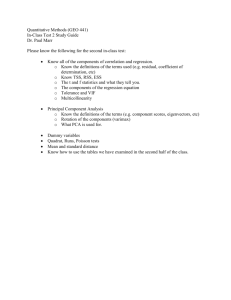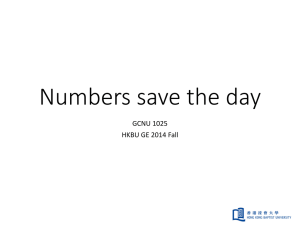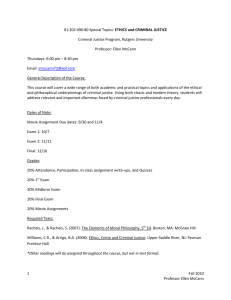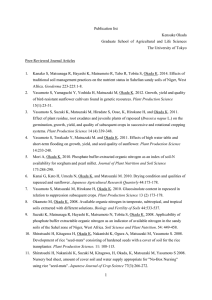Academic Dishonesty - MU BERT
advertisement
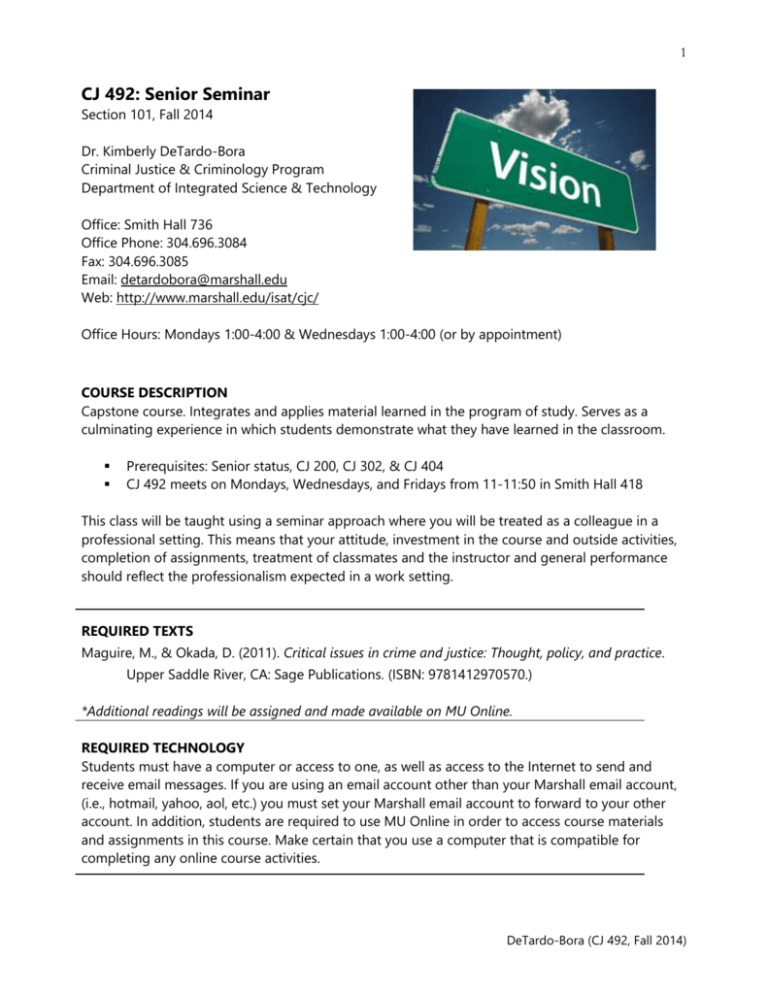
1 CJ 492: Senior Seminar Section 101, Fall 2014 Dr. Kimberly DeTardo-Bora Criminal Justice & Criminology Program Department of Integrated Science & Technology Office: Smith Hall 736 Office Phone: 304.696.3084 Fax: 304.696.3085 Email: detardobora@marshall.edu Web: http://www.marshall.edu/isat/cjc/ Office Hours: Mondays 1:00-4:00 & Wednesdays 1:00-4:00 (or by appointment) COURSE DESCRIPTION Capstone course. Integrates and applies material learned in the program of study. Serves as a culminating experience in which students demonstrate what they have learned in the classroom. Prerequisites: Senior status, CJ 200, CJ 302, & CJ 404 CJ 492 meets on Mondays, Wednesdays, and Fridays from 11-11:50 in Smith Hall 418 This class will be taught using a seminar approach where you will be treated as a colleague in a professional setting. This means that your attitude, investment in the course and outside activities, completion of assignments, treatment of classmates and the instructor and general performance should reflect the professionalism expected in a work setting. REQUIRED TEXTS Maguire, M., & Okada, D. (2011). Critical issues in crime and justice: Thought, policy, and practice. Upper Saddle River, CA: Sage Publications. (ISBN: 9781412970570.) *Additional readings will be assigned and made available on MU Online. REQUIRED TECHNOLOGY Students must have a computer or access to one, as well as access to the Internet to send and receive email messages. If you are using an email account other than your Marshall email account, (i.e., hotmail, yahoo, aol, etc.) you must set your Marshall email account to forward to your other account. In addition, students are required to use MU Online in order to access course materials and assignments in this course. Make certain that you use a computer that is compatible for completing any online course activities. DeTardo-Bora (CJ 492, Fall 2014) 2 STUDENT LEARNING OUTCOMES FOR THE DEPARTMENT OF INTEGRATED SCIENCE & TECHNOLOGY 1. Students will demonstrate proficiency in the utilization of contemporary technologies to solve real-world problems. 2. In the development of a research project, students will scientifically analyze data, evaluate and incorporate relevant research, and describe potential implications. 3. Students will effectively communicate in relating findings and recommendations resulting from course projects. STUDENT LEARNING OUTCOMES FOR THE CRIMINAL JUSTICE & CRIMINOLOGY PROGRAM Upon completion of the Bachelor of Arts degree in criminal justice, and in part emphasized and reinforced through this course, undergraduate students will be able to: 1. Differentiate Among Criminal Justice System Components, Roles, and Practices--Students will define and properly use specialized terms to describe, explain, and differentiate the components, roles, and practices of the criminal justice system. 2. Apply Theory in Criminal Justice and Criminology--Students will describe, explain, and differentiate major theories and theorists in criminal justice and criminology, and use one or more of these theories to explain a selected behavior (e.g., crime), event (e.g. victimization), or policy response (e.g., law). COURSE LEARNING OUTCOMES MATRIX Course Learning Outcomes (A) Students will identify and analyze career opportunities, trends, and future career pathways. (B) Students will produce a career and/or graduate or law school portfolio, offering a systematic approach to immediate and life-long career decision-making. (C) Students will demonstrate decisionmaking, goal setting, problem solving, group management, time management, and stress management skills. How Each Outcome is Practiced in this Course Assigned readings, in-class discussions, in-class activities Assigned readings, in-class discussions, in-class activities Assigned readings, in-class discussions, in-class activities How Each Outcome is Evaluated in this Course In-class and out-of-class assignments (i.e., obituary assignment, career path assignment, etc.) Resume, cover letter or personal statement, job/school application, writing sample In-class and out-of-class assignments (i.e., skills practice and assessments) DeTardo-Bora (CJ 492, Fall 2014) 3 Course Learning Outcomes How Each Outcome is Practiced in this Course (D) Students will compose and deliver a In-class discussions professional oral presentation. (E) Students will critically examine a Assigned readings, in-class specific issue in the field of criminal discussions, in-class justice/criminology and develop a activities, skills practice and research-based writing sample that assessments presents the results of a thorough analysis as well as a proposed solution to the problem. How Each Outcome is Evaluated in this Course Presentation Writing sample ASSESSMENT MEASURES AND DETERMINATION OF GRADES Each student learning outcome is assessed in the following manner: Grading Scale: 90% & Above =A 80%-89% = B 70%-79% = C Course Requirements: Writing Sample (30%) Presentation (20%) Career Papers & Portfolio (40%) Active Participation & Attendance (10%) Score(s) 60%-69% = D 59% & Below = F Weighted % Weighted % Ave. X .30 X .20 + X .40 + X .10 + Grand Total = Calculating and checking your class grade: Please note that course grades are calculated using weighted percentages as shown above. You can always monitor your current course grade by logging into MU Online in our course. Grades are displayed in the Grade Center. WRITING SAMPLE: CRITICAL ISSUES IN CRIMINAL JUSTICE (30%) Students will prepare a 5+ page paper (aka writing sample) that is hinged on a topic related to their career goals (but not discussed exactly in the text). Some possible topics include: resolving the problem of jail overcrowding, police brutality, technology and the right to privacy, illegal weapon possession, domestic terrorism, racial profiling, homeland security issues, cyberbullying, neuroscience and the law, adequate defense counsel, juveniles sentenced for life in prison, etc. Law School/Graduate School Track- Students who are interested in law school, graduate school, administrative work, or research in the profession are encouraged to choose a topic related to the legal profession or one of the issues similar to one from our textbook. Criminal Justice Profession Track- Students who wish to seek employment or advancement in the field (i.e., law enforcement, corrections, probation, juvenile services, victims’ services, etc.) DeTardo-Bora (CJ 492, Fall 2014) 4 immediately following graduation are encouraged to write about a critical issue related to the intended field. What if you have decided at this stage that the criminal justice profession is not for you? What if you have decided to go to culinary arts school, or you wish to join the circus, or you want to backpack throughout Europe instead? A professional writing sample is still an important document, so you will need to select an area of the criminal justice profession for which you think you are best suited. PRESENTATION (20%) Each student will complete an 8-10 minute presentation related in part to his/her desired profession or career goals coupled with the current issue that was analyzed in his/her writing sample. More details to follow. CAREER PAPERS & PORTFOLIO (40%) Throughout this course, you will prepare a series of papers as a professional portfolio. They include: a cover letter, a resume, a writing sample, and documentation of a completed job/law school/graduate school application or mock one. Each piece will be developed and submitted individually. Revised versions will be submitted as a complete portfolio near the end of the semester for a final grade. ACTIVE PARTICIPATION & ATTENDANCE (10%) Students are expected to prepare for each class by reading the required assignments and participating in class or small group discussions. In a traditional sense, class participation involves, but is not limited to, asking and answering questions and attendance (you have to be present to participate!). Moreover, participation will include the completion of small in-class or out-of-class exercises and skills practice and assessments. Each student will be awarded 100 points at the beginning of the semester for attendance. These points are yours to lose or keep. For each class day missed without a legitimate excuse and documentation from the Dean of Student Affairs, 2.5 points will be deducted from your attendance grade. If you miss a class, I recommend that you obtain the lecture notes/assignments from that day. Consistent tardiness (excessive) will result in a reduction of your attendance grade as well ADDITIONAL POLICIES University Policies: By enrolling in this course, you agree to the University Policies: Academic Dishonesty/ Excused Absence Policy for Undergraduates/ Computing Services Acceptable Use/ Inclement Weather/ Dead Week/ Students with Disabilities/ Academic Forgiveness/ Academic Probation and Suspension/ Academic Rights and Responsibilities of Students/ Affirmative Action/ and Sexual Harassment. Please read the full text of each policy by going to www.marshall.edu/academic-affairs and clicking on “Marshall University Policies.” Or, you can access the policies directly by going to http://www.marshall.edu/academic-affairs/?page_id=802. DeTardo-Bora (CJ 492, Fall 2014) 5 Emails and Teacher-Student Correspondence: If you have any questions about the course material, exams, or assignments you may email me, visit me during my office hours, or schedule an appointment. If you email me, under most circumstances, I will get back to you within 24 hours on weekdays. However, there may be times when I am out of the office (for meetings, class, or conferences), hence, delaying my response. Class Absences: I understand that there are circumstances that may arise throughout the semester that prevent a student from attending class. Documentation of an excused absence can be obtained from the Dean of Student Affairs, MSC 2W38. Excused absences include: death or illness of an immediate family member, pre-approved university sponsored activity, athletics, academic activities, shortterm military obligation, jury duty/court appointment, and/or religious holiday (see MU Undergraduate Catalog and the Graduate Catalog). Nonetheless, if you miss class it is your responsibility as a student to obtain any materials or assignments that you missed on that day. Academic Dishonesty: Academic Dishonesty includes cheating, fabrication and falsification of data or information, plagiarism, bribes/favors/threats, and complicity (i.e., helping or attempting someone commit an act of dishonesty). As stated in the policy, “A student, by voluntarily accepting admission to the institution or enrolling in a class or course of study offered by Marshall University accepts the academic requirements and criteria of the institution. It is the student’s responsibility to be aware of policies regulating academic conduct, including the definitions of academic dishonesty, the possible sanctions and the appeal process. For the purposes of this policy, an academic exercise is defined as any assignment, whether graded or ungraded, that is given in an academic course or must be completed toward the completion of degree or certification requirements. This includes, but is not limited to: Exams, quizzes, papers, oral presentations, data gathering and analysis, practica and creative work of any kind” (MU Undergraduate Catalog). If a student violates this policy, discretion will be used by the instructor; the possible sanction to be applied will be a failing grade for the assignment, exam, or paper. For those of you who need a reminder about the policy, please refer to the MU Undergraduate/Graduate Catalog. Plagiarism: For students (major or non-majors; undergraduates and graduates) who plagiarize a paper that is less than 10 pages in length, a letter grade of zero will be issued for that assignment. When a student plagiarizes a major research paper, report, legal paper, etc., that is 10 pages or more in length, a failing grade will be issued to the student for the course. It should be noted that students are entitled to an appeals process. The protocol for doing so is described under the heading “Academic Dishonesty Policy” and the subheading “Appeals Process” in the MU Undergraduate/Graduate Catalog. Extra Credit: There is one opportunity to receive extra credit in this course. That is, students may present at the WVCJEA conference on Friday, November 14 at Fairmont State University and earn up to 10 points added to their final course grade. In addition, students who simply attend the conference may earn up to 10 points, which will be added to their active participation and attendance grade. Abstracts DeTardo-Bora (CJ 492, Fall 2014) 6 for presentations and papers for the state competition are due Thursday, October 28. More details will be posted on MU Online. Laptops and Tablets: Over time, I have observed more students who prefer to use laptops and tablets in class. If you wish to use either a laptop or tablet in class, you must receive permission from me, and you must present a compelling reason for doing so. If you are approved to use the laptop or tablet for note-taking, no other sites or functions may be open, and you are expected to make regular eye contact when I am speaking. Classroom Civility: 1. All students are expected to be in class on time (including exam days). 2. All pagers, cell phones, and electronic devices such as IPods or MP3 players must be turned off before you enter the classroom. Please no text messaging or tweeting during class or during exams. 3. One-on-one or personal conversations during lecture or class discussions are not permitted. 4. Respect different opinions and keep an open mind. Support your fellow classmates and reward each other with positive remarks/comments. 5. All students are expected to abide by the academic dishonesty policy-this means no cheating or plagiarizing! 6. Students are expected to speak one at a time. Do not be disruptive. 7. Working on other materials during class time is considered disruptive not only to the instructor but to other classmates as well. 8. Do not use class time to catch up on your ZZZZZ’s. 9. No food or alcoholic beverages are permitted (non-alcoholic beverages are acceptable). 10. Students are prohibited from leaving the classroom once the lecture or discussion has started. Only in the case of an emergency can a student leave the room. If you need to leave class early for some reason, notify the instructor in advance. The DeTardo-Bora Policy: As students have a code of conduct to follow, I believe the instructor should follow one as well. Throughout this course, I will make an effort to see that the following responsibilities are carried out (these responsibilities were adapted from McKeachie, 1999). 1. I will encourage the free pursuit of learning 2. I will demonstrate respect for students 3. I will respect confidentiality 4. I will model the best scholarly and ethical standards 5. I will foster honest academic conduct and ensure fair evaluation 6. I will avoid exploitation, harassment, or discrimination DeTardo-Bora (CJ 492, Fall 2014) 7 Tentative Course Outline: CJ 492 (sec. 101) Dates/Course Topics Week 1: 8/25, 8/27, 8/29 Syllabus review Introduction-The many voices in CJ Professional development-“So now what?” Week 2: 9/1*, 9/3, 9/5 *NO CLASS-Labor Day The importance of ethics in CJ Professional development-Ethics Week 3: 9/8, 9/10, 9/12 Criminological theory and crime explanation Unleashing the power in CJ theory Professional development- Professionalismcorrespondence, dress, etiquette, social media, etc. Week 4: 9/15, 9/17, 9/19 Gender mattters Race and crime Professional development- Future career path & goals Week 5: 9/22, 9/24, 9/26 Terrorism and the CJS Developments in computer crime Professional development-Cover letter or personal statement Week 6: 9/29, 10/1, 10/3 Police theory Contemporary policing Professional development-Resume writing (career services speaker) Week 7: 10/6, 10/8, 10/10 Public policy American courts Professional development-Interviewing skills (guest panel) Week 8: 10/13, 10/15, 10/17 Philosophical and ideological underpinnings of corrections Community corrections, rehabilitation, reintegration, and reentry Professional development-Interviewing practice and etiquette (attire & tattoos) Readings Assignments Due Chap. 1, Maguire & Okada Chap. 2, Maguire & Okada Obituary assignment due (9/5) Chaps. 3 & 4, Maguire & Okada Chaps. 6 & 7, Maguire & Okada Chaps. 11 & 12, Maguire & Okada Career path assignment due (9/26) Chaps. 14 & 15, Maguire & Okada Cover letter or personal statement due (10/3) Chaps. 17 & 18, Maguire & Okada Resume due (10/10) Chaps. 20 & 21, Maguire & Okada DeTardo-Bora (CJ 492, Fall 2014) 8 Week 9: 10/20, 10/22, 10/24 Restorative justice APA review and paper preparations Professional development- Leadership Week 10: 10/27*, 10/29, 10/31 Skills practice-spreadsheets *WVCJEA abstracts due (10/28) Professional development-presentation skills Professional development- Group dynamics/ Keirsey temperament sorter Week 11: 11/3, 11/5, 11/7* Student presentations Skills practice-interpreting data *NO CLASS-Graduate Exams Week 12: 11/10, 11/12, 11/14* Student presentations Professional development- Flexibility and adaptability *NO CLASS-WVCJEA Conference (11/14 -crime scene competition) Week 13: 11/17, 11/19, 11/21 Student presentations Skills practice-terms assessment Professional development-Problem solving, harassment, discrimination, etc. Week 14: 11/24, 11/26, 11/28 NO CLASS-Thanksgiving Break Week 15: 12/1, 12/3, 12/5 Student presentations Skills practice-research and theory assessment Professional development-stress management (hobbies, healthy families) Final Exam December 9 (10:15-12:15) Chap. 22, Maguire & Okada Writing sample due (10/24) Complete portfolio and applications due (11/12) Portfolios returned DeTardo-Bora (CJ 492, Fall 2014)



